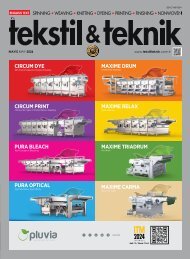Create successful ePaper yourself
Turn your PDF publications into a flip-book with our unique Google optimized e-Paper software.
31<br />
“MOST IMPORTANTLY, PATIENT FOLLOW-UP”<br />
Considering your experiences with more than 5,000<br />
general surgery and more than 2,000 bariatric<br />
surgeries, can you share the prominent elements of<br />
your patient services? Also, what are the steps you<br />
take to make obesity surgery more widely known in<br />
society?<br />
“The first step in obesity surgery is for the patient to decide<br />
and come to the clinic. Clinically, we evaluate these patients<br />
thoroughly and decide whether they are suitable for surgery.<br />
We decide on surgery according to the criteria of the Ministry<br />
of Health and obesity associations. In patients undergoing<br />
surgery, the shortest stage is the surgery phase. The most<br />
important thing is follow-up in these patients. Being aware of<br />
the importance of clinical follow-up, we follow patients for at<br />
least 5 years. We keep a record of these patients, reach them<br />
for certain periods of time and carry out clinical follow-ups. We<br />
still have patients who have been followed for over ten years.<br />
There are many misconceptions in society about these<br />
surgeries. Because of these wrong thoughts and fears, people<br />
who would benefit greatly from surgery give up on surgery.<br />
We try to explain these surgeries and raise public awareness<br />
by participating in programs on social media and television.<br />
We periodically organize meetings with people who have had<br />
surgery and who are considering having surgery, bring them<br />
together and provide information.”<br />
“PATIENTS CAN BE SAVED FROM OPEN SURGERY”<br />
You also provide services in the field of advanced laparoscopic<br />
surgery. Can we get information about your surgeries such as<br />
hiatal hernia and gastric reflux?<br />
“Thanks to advanced laparoscopies, many surgeries are<br />
performed with this method and patients are saved from open<br />
surgeries. Thus, the pain is less and the return to work and<br />
normal life is shorter. One of these surgeries is fundoplication<br />
surgery for stomach hernia and reflux. Thanks to advanced<br />
laparoscopy, this surgery is performed in a much shorter time<br />
and much more effectively. We use this surgery effectively in<br />
our clinic.”<br />
“THE MOST APPLIED TECHNIQUE TODAY IS GASTRIC<br />
SLEEVE SURGERY”<br />
Among the surgeries you perform in obesity surgery,<br />
there are methods such as sleeve gastrectomy,<br />
gastric bypass, and mini gastric bypass. Can you give<br />
information about the advantages of these surgeries<br />
and in which cases they are preferred?<br />
“There are many methods in obesity surgeries. Some of them<br />
are abandoned over time and some new techniques emerge.<br />
The most commonly used technique today is gastric sleeve<br />
surgery. This method is preferred because it is simple, causes<br />
little trouble for the patient, and provides good weight loss.<br />
Another advantage of this method is that it can be changed to<br />
another method after a certain period of time.<br />
Methods such as gastric bypass and mini gastric bypass<br />
are among the most preferred methods, although they<br />
are not as popular as sleeve gastrectomy. These methods,<br />
unlike the sleeve gastrectomy, are surgeries that also cause<br />
malabsorption and are stronger than the sleeve gastrectomy.<br />
We prefer gastric bypass surgery especially in patients with<br />
reflux and advanced diabetes. Mini gastric bypass is technically<br />
simpler than gastric bypass surgery, but its metabolic effects<br />
are more pronounced. It is more preferred in patients with<br />
metabolic diseases.”<br />
“EN ÖNEMLİSİ, HASTA TAKİBİ”<br />
5.000’den fazla genel cerrahi ve 2.000’den<br />
fazla obezite cerrahisi ameliyatınızla elde<br />
ettiğiniz deneyimleri düşündüğümüzde, hasta<br />
hizmetlerinizde öne çıkan unsurları paylaşabilir<br />
misiniz? Ayrıca, obezite cerrahisinin toplumda<br />
daha geniş bir bilinirliğe sahip olması için attığınız<br />
adımlar nelerdir?<br />
“Obezite cerrahilerinde ilk aşama hastanın karar verip kliniğe<br />
gelmesidir. Klinik olarak bu hastaları iyi bir değerlendirmeden<br />
geçirip ameliyata uygun olup olmadığına karar veriyoruz.<br />
Sağlık Bakanlığı’nın ve obezite derneklerinin kriterlerine göre<br />
ameliyat kararı veriyoruz. Ameliyat olan hastalarda en kısa<br />
aşama ameliyat safhasıdır. En önemlisi bu hastalarda takiptir.<br />
Klinik olarak takibin öneminin farkında olarak hastaları en az 5<br />
yıl takip ediyoruz. Bu hastaları kayıt altında tutup belli sürelerle<br />
onlara ulaşıp klinik takiplerini yapıyoruz. Hala on yılın üzerinde<br />
takipli hastalarımız bulunmaktadır.<br />
Toplumda bu ameliyatlar konusunda çok yanlış düşünceler<br />
bulunmaktadır. Bu yanlış düşünceler ve korkular sebebiyle<br />
ameliyattan çok fayda görecek kişiler ameliyattan<br />
vazgeçmektedir. Sosyal medyada ve televizyonda programlara<br />
katılarak bu ameliyatları anlatıp toplumu bilinçlendirmeye<br />
çalışıyoruz. Belli aralarla ameliyat olmuş ve ameliyat olmayı<br />
düşünen insanlarla toplantılar düzenleyip bunları bir araya<br />
getiriyoruz ve bilgilendirmeler yapıyoruz.”<br />
“HASTALAR AÇIK AMELİYATLARDAN<br />
KURTULABİLİYOR”<br />
İleri laparoskopik cerrahi alanında da hizmet<br />
veriyorsunuz. Mide fıtığı, mide reflüsü gibi<br />
ameliyatlarınız hakkında bilgi alabilir miyiz?<br />
“İleri laparoskopiler sayesinde birçok ameliyat bu yöntemle<br />
gerçekleştirilerek hastalar açık ameliyatlardan kurtulmaktadır.<br />
Böylece ağrı daha az, işe ve normal hayata dönüş daha kısadır.<br />
Bu ameliyatlardan biri de mide fıtığı ve reflü için yapılan<br />
fundoplikasyon ameliyatlarıdır. İleri laparoskopi sayesinde<br />
bu ameliyat çok daha kısa sürede ve çok daha etkin şekilde<br />
gerçekleştirilmektedir. Bu ameliyatı da kliniğimizde etkin<br />
şekilde kullanıyoruz.”<br />
“GÜNÜMÜZDE EN ÇOK UYGULANAN TEKNİK,<br />
TÜP MİDE AMELİYATI”<br />
Obezite cerrahisinde yaptığınız ameliyatlar arasında<br />
tüp mide, gastrik bypass, mini gastrik bypass gibi<br />
yöntemler bulunuyor. Bu ameliyatların avantajları<br />
ve hangi durumlarda tercih edildiği konusunda bilgi<br />
verebilir misiniz?<br />
“Obezite ameliyatlarında birçok yöntem vardır. Bazıları<br />
zamanla terkedilmekte ve bazı yeni teknikler de ortaya<br />
çıkmaktadır. Günümüzde en çok uygulanan teknik tüp mide<br />
ameliyatıdır. Bu yöntem basitliği, hastaya az sorun çıkarması<br />
ve iyi kilo verdirmesi nedeniyle daha çok tercih edilmektedir.<br />
Bu yöntemin bir diğer avantajı belirli bir süre sonra başka<br />
yönteme çevrilebilmesidir.<br />
Gastrik bypass ve mini gastrik bypass gibi yöntemler tüp mide<br />
kadar olmasa da çok tercih edilen yöntemlerdendir.<br />
Bu yöntemler tüp mideden farklı olarak emilim bozukluğu da<br />
yapan ameliyatlardır ve tüp mideye göre daha kuvvetlidirler.<br />
Gastrik bypass ameliyatlarını özellikle reflüsü olan ve ileri<br />
derece de diyabeti olan hastalarda daha çok tercih etmekteyiz.<br />
Mini gastrik bypass teknik olarak gastrik bypass ameliyatına<br />
göre daha basittir ama metabolik etkileri daha belirgindir.<br />
Metabolik hastalığı olan hastalarda daha çok tercih edilir.”<br />
<strong>Ocak</strong> - January <strong>2024</strong>

















